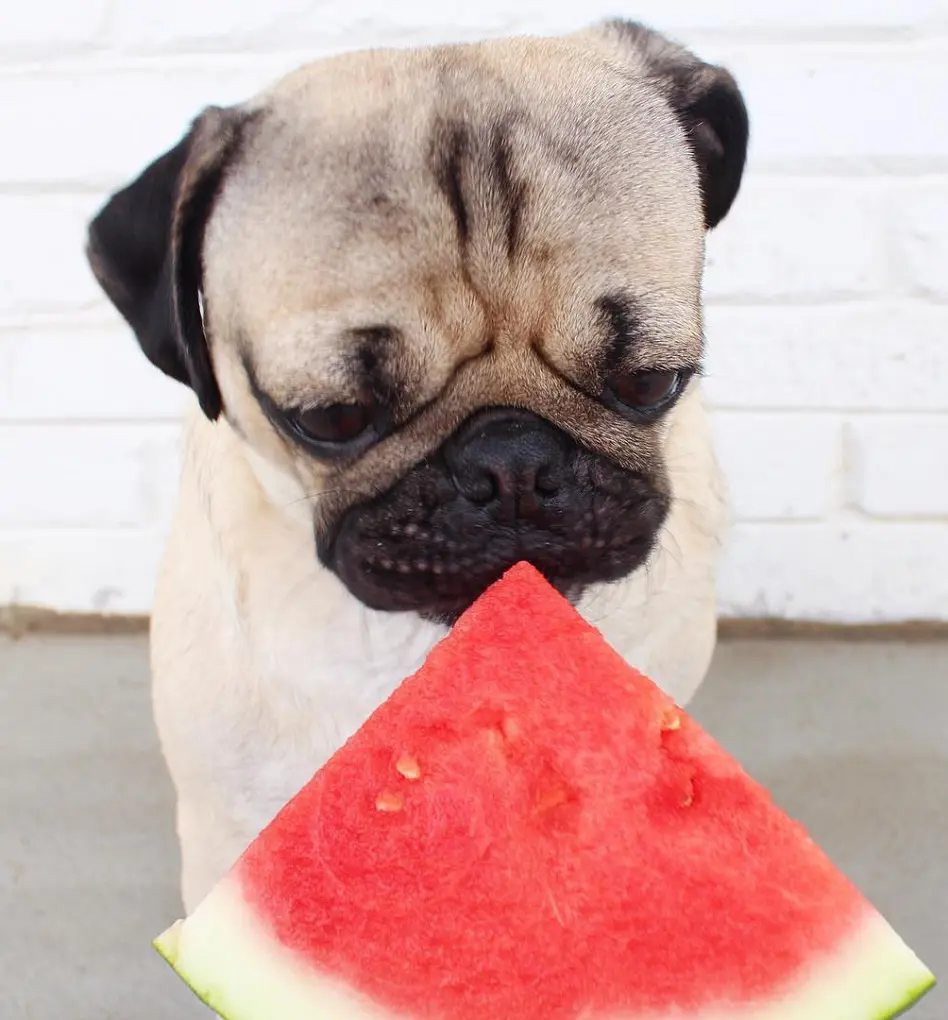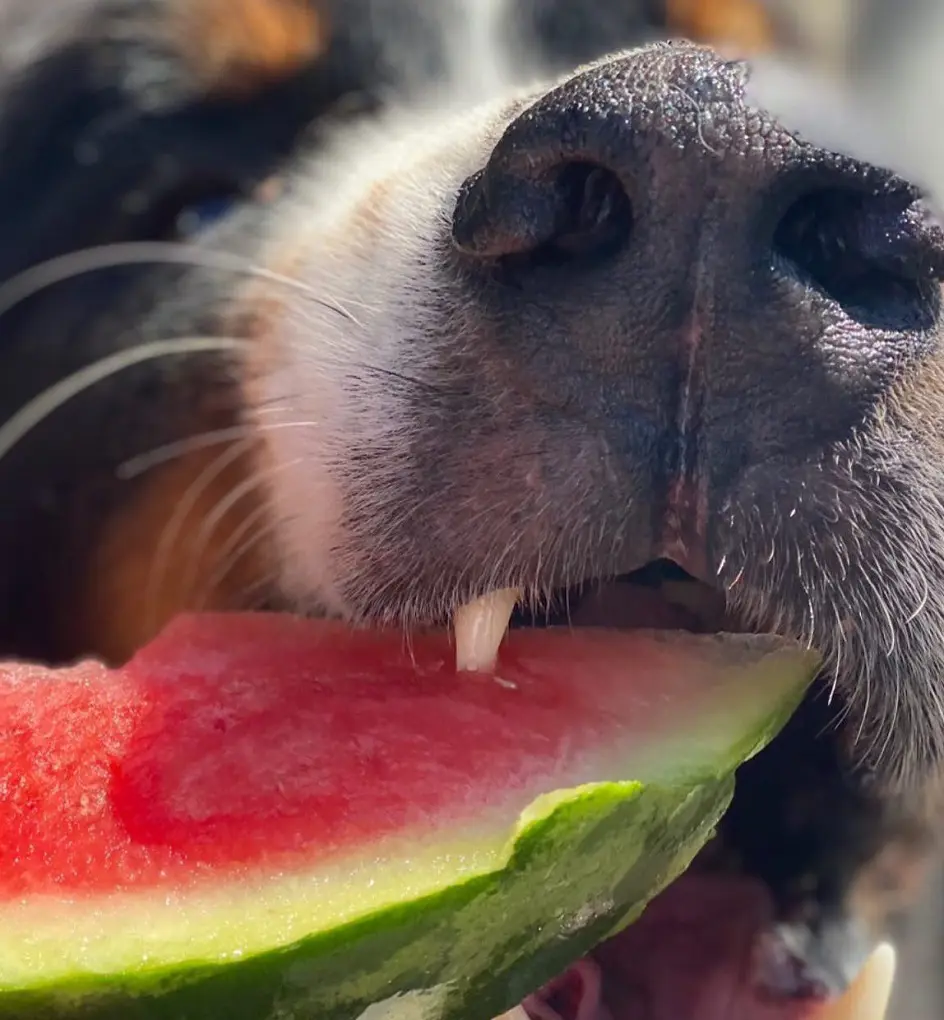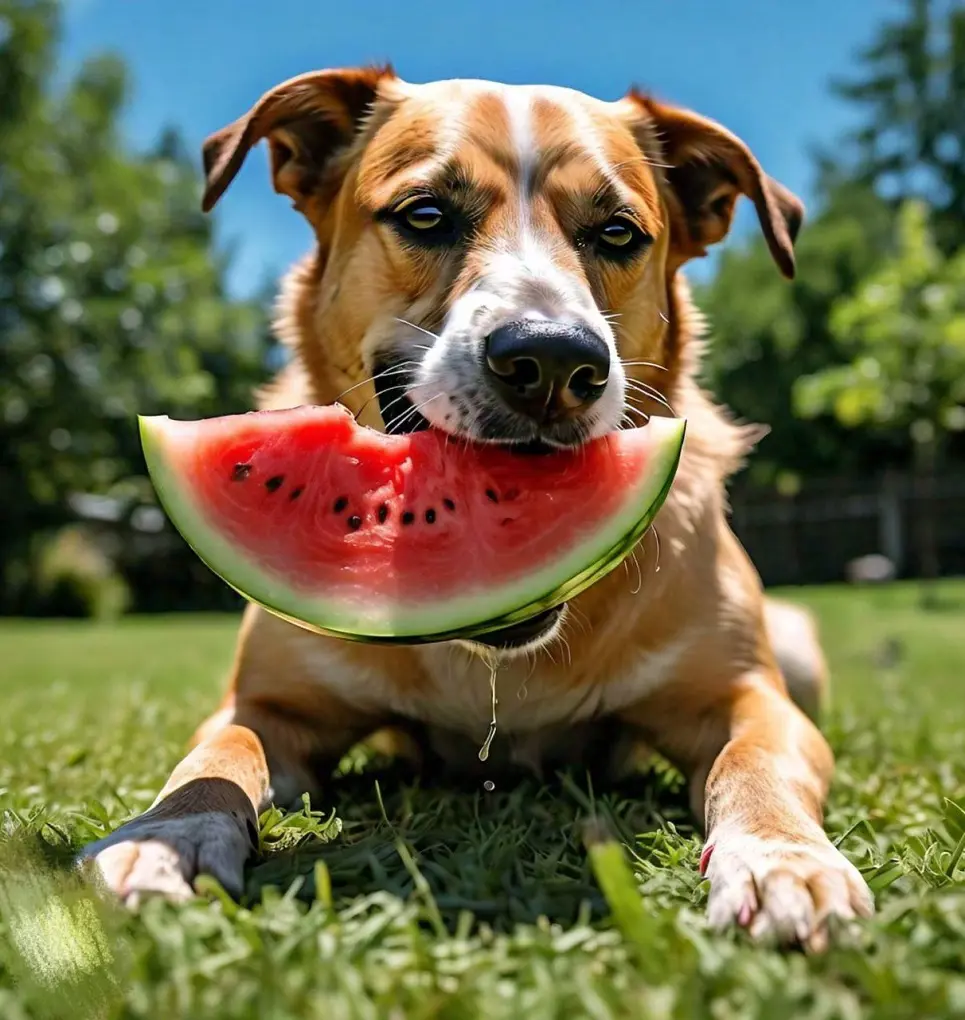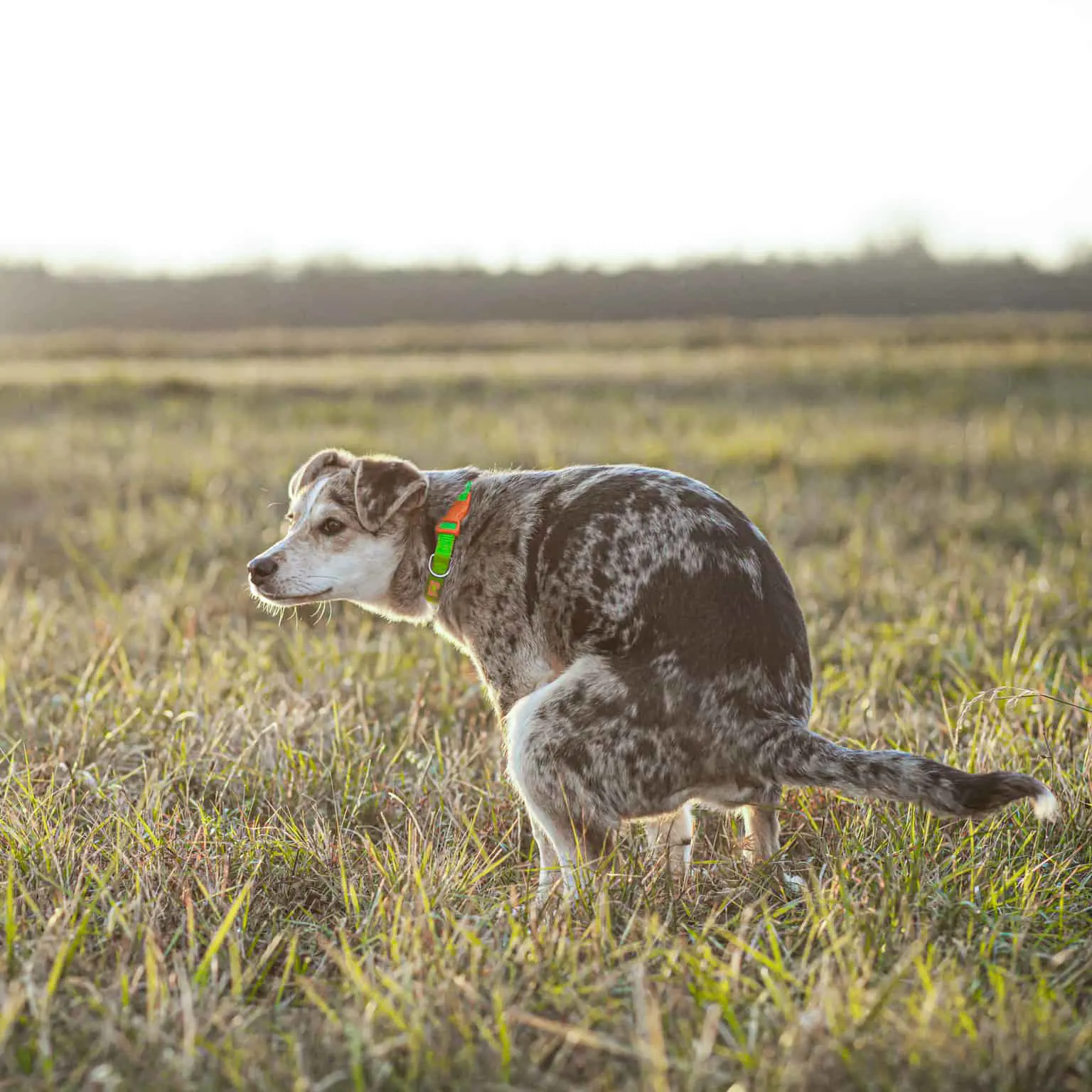Is Watermelon Good For Dogs?

Watermelon can be a nutritious treat for dogs when given in moderation. Over 90% of the flesh is made up of water, which helps with hydration, especially in hot conditions. It also contains fiber for a healthy digestive system and important vitamins and minerals like A, B6, and C.
But before giving your dog watermelon, make sure to remove the seeds and rind since these can lead to blockages in the intestines and upset stomachs.
A veterinarian should be consulted before adding watermelon to your dog's diet, just like you would with any new food, especially if your dog is on a restricted diet or has health issues already.
Nutritional Benefits of Watermelon for Dogs
Here are some of the nutritional benefits of watermelon for dogs:
Hydration
Watermelon's impressive water content, exceeding 92%, makes it a valuable tool in keeping your dog hydrated. This is particularly beneficial during periods of increased fluid loss, such as hot weather or exercise.
As dogs primarily cool themselves through panting, they can lose significant amounts of water through this process. Offering watermelon as a refreshing treat can help replenish lost fluids and ensure your canine companion stays adequately hydrated, promoting overall health and well-being.
Vitamin A
Vitamin A plays a multifaceted role in canine health. It's essential for maintaining healthy vision, particularly night vision, by contributing to the production of rhodopsin, a light-sensitive pigment in the retina.
Also, vitamin A promotes healthy cell growth throughout the body and bolsters the immune system, making dogs more resistant to infections and illnesses. Watermelon serves as a natural source of Vitamin A, contributing to these vital functions and promoting your dog's overall well-being.
Vitamin B6
Vitamin B6, found naturally in watermelon, plays a critical role in several of your dog's essential bodily functions. Firstly, it supports the production of red blood cells, which are responsible for transporting oxygen throughout the body.
Secondly, Vitamin B6 aids in metabolizing carbohydrates and fats for energy, ensuring your dog has the fuel needed for daily activities. Finally, this vitamin contributes to maintaining a healthy nervous system, which is crucial for proper muscle control, coordination, and sensory perception.
Vitamin C
Within a dog's immune system, Vitamin C plays a significant role. It functions as a powerful antioxidant, shielding cells from harmful damage caused by free radicals. These free radicals can weaken the immune system's ability to fight off illness.
By being rich in Vitamin C, watermelon acts as a natural defense booster for your dog. This essential vitamin strengthens their immune system, making them better equipped to resist infections and maintain overall health.
Muscle and Nerve Support with Potassium
Potassium plays a vital role in both muscular and neurological functions within canine bodies. It acts as an electrolyte, regulating the flow of electrical impulses between nerves and muscles. This ensures proper muscle contractions, allowing for coordinated movement and efficient organ function.
Also, potassium facilitates the transmission of signals throughout the nervous system, enabling your dog to react swiftly and maintain good cognitive function. The presence of potassium in watermelon contributes to these essential processes, promoting optimal muscle strength, nerve transmission, and overall well-being in your dog.
Weight-Conscious Treat

When considering treats for your dog, watermelon offers a weight-conscious alternative. Compared to other options, watermelon boasts a significantly lower calorie content. This allows you to indulge your dog's sweet tooth while promoting healthy weight management.
By incorporating watermelon into your dog's diet in moderation, you can provide a satisfying treat without the added calories that can contribute to weight gain.
Digestive Aid with Fiber
The presence of a small amount of fiber can contribute to your dog's digestive health. Fiber plays a vital role in regulating the digestive process. It helps move food smoothly through the intestines, preventing constipation and promoting regularity.
Further, fiber serves as a prebiotic, nourishing the growth of beneficial gut bacteria. These bacteria contribute to a healthy digestive ecosystem, aiding nutrient absorption and potentially boosting the immune system.
Electrolyte Replenishment
Exercise and hot weather can cause dogs to lose electrolytes through sweating or panting. Electrolytes are minerals essential for various bodily functions, including muscle function and proper hydration. Watermelon emerges as a natural solution for replenishing these lost electrolytes.
It contains key electrolytes like potassium and magnesium, which can help restore electrolyte balance and support optimal hydration in dogs. This makes watermelon a valuable addition to a dog's diet, particularly during periods of increased activity or hot weather.
Tempting Treats for Low Appetite
In instances where a dog experiences a decreased appetite due to illness or other factors, watermelon can be a valuable tool for encouraging food intake.
The fruit's naturally refreshing taste and juicy texture act as a natural stimulant, making it appealing to a dog with a diminished desire to eat. This can be particularly beneficial during recovery from illness or following surgery when maintaining proper nutrition is crucial for healing and overall health.
Potential Heart Health Benefits
Watermelon's nutritional profile for dogs might hold a potential benefit for heart health. This stems from the presence of lycopene, an antioxidant. Lycopene's role in canine heart health is an area of ongoing research.
However, studies suggest lycopene's antioxidant properties may contribute to improved heart health in humans. While conclusive evidence for dogs is still being gathered, the presence of lycopene adds another layer of potential benefit to the nutritional value of watermelon for canine companions.
How to Feed a Dog Watermelon

Some safe ways to feed dog watermelon are:
In Chunks
The simplest option is to give them in chunks. Cut the watermelon into slices, then carefully scrape off the rinds and seeds. To avoid choking problems, cut the flesh into bite-sized pieces appropriate for the breed of your dog.
Frozen Chunks
Ideal for sweltering summertime, once the rinds and seeds have been removed, freeze the watermelon pieces. This gives your dog a cold, hydrated treat that satisfies their sweet desire and helps them calm off.
Watermelon Puree Popsicles
This is the best way to make frozen treats without making a mess. Puree the flesh from the watermelon without seeds and put it in silicone molds or ice cube trays to freeze. Your dog may enjoy watermelon in a fun and hydrating way with these frozen treats.
Watermelon Ice Cream
This choice combines yogurt's probiotic advantages with the refreshing taste of watermelon. Blend plain, unsweetened yogurt with frozen pieces of watermelon without seeds. You can put this combination straight into your dog's dish or, for longer enjoyment, pack it inside a chew toy.
How Much Watermelon Can Dogs Eat?
As an occasional treat, a few tiny pieces of watermelon, roughly 1-2 bite-sized chunks per 10 pounds of body weight is sufficient when giving it to dogs. This serving amount makes sure the dog gets the hydration benefits without going crazy with natural sugars, which can cause weight or stomach issues.
A few extra pieces may be appropriate for larger dogs, but it's crucial to keep an eye out for any signs of gastrointestinal distress. Watermelon should always be introduced gradually to avoid any likely allergic responses.
Note that a dog's daily calorie intake should consist of 90% calories from a balanced, nutritionally complete food, with treats like watermelon making up only 10% of the total.
Potential Risks of Feeding Watermelon to Dogs

While watermelon offers some benefits, be mindful of these risks for your dog:
1. Choking Hazard
Dogs are seriously at risk of choking on seeds and rinds. It is very easy for the seeds to get stuck in a dog's throat, which can be extremely dangerous. The rough peel is also difficult to digest and, if ingested, can clog the digestive tract.
In addition to causing severe abdominal discomfort and vomiting, this blockage may need to be surgically removed. To avoid these hazards, always remove the seeds and rind before giving your dog watermelon.
2. Digestive Issues
Dogs who eat watermelon seeds may experience digestive issues. Large doses of seeds have the potential to build up in the digestive tract and cause a blockage. Symptoms including nausea, vomiting, diarrhea, and tiredness may be brought on by this blockage.
In extreme cases, veterinary assistance might be needed to fix the problem. Seeds can cause gastrointestinal distress even at lesser doses by irritating the stomach lining. So, before giving your dog watermelon, make sure to remove all of the seeds with care for their safety.
3. Rind Problems
Dogs have trouble breaking down the stiff, fibrous rind of watermelons. It can cause some intestinal problems when consumed, such as digestive tract inflammation and obstructions.
These obstructions may need to be surgically removed and may cause symptoms like nausea, constipation, and abdominal pain. Additionally, the rind's rough texture may irritate the lining of the stomach, causing pain and digestive problems.
4. Sugar Content
Watermelon has a high natural sugar content despite being low in calories. In dogs, especially those who are already predisposed to obesity and diabetes, consuming significant quantities of sugar can exacerbate these illnesses.
Consuming too much sugar can cause weight gain, which raises the risk of heart disease, joint problems, and other illnesses. Even naturally occurring sugars can elevate blood sugar levels in diabetic dogs, exacerbating their disease.
5. Overeating
Overfeeding watermelon to your dog can cause upset stomach and diarrhea, among other digestive issues. Because watermelon has a lot of fiber and water, eating it in big amounts can upset your dog's digestive system. Gas, loose stools, and discomfort in the abdomen may arise from this.
Likewise, introducing a new food abruptly and in large quantities might upset the delicate balance of gut flora, resulting in digestive problems. Offer your dog limited amounts of watermelon and watch how they respond to it to avoid these issues.
6. Allergic Reactions
Although they are uncommon, allergies to watermelon can occur in some dogs. An allergic response can cause hives, swelling, itching, and gastro problems including vomiting or diarrhea. In extreme situations, an allergic reaction may make breathing difficult, necessitating emergency vet care.
When giving your dog watermelon for the first time, start modestly and keep an eye out for any indication of an allergic response. Give up feeding watermelon and see your veterinarian if any symptoms show up.
7. Dental Health
If dogs habitually eat watermelon, the natural sugars in it may cause dental issues. Sugars may encourage the development of oral bacteria, which can result in the accumulation of plaque and tartar. This can lead to tooth decay, gum disease, and foul breath over time.
Give your dog watermelon as a treat once in a while and make sure they receive regular dental treatment, such as brushing their teeth and giving them dental chews, to keep their teeth in good condition. Keeping an eye on your dog's total sugar intake will assist in maintaining dental health.
8. Pesticides
Watermelons that are not organic might contain pesticides that, if consumed by dogs, could be fatal. Numerous health concerns, such as neurological disorders, chronic long-term illnesses, and gastrointestinal disturbances, can be brought on by pesticide exposure.
Always properly wash a watermelon before giving it to your dog to reduce the possibility of pesticide residues. As an alternative, choose organic watermelon, which is farmed and devoid of artificial pesticides.
Can Dogs Eat Watermelon Rind?

When given in moderation, watermelon's delicious flesh makes a delightful and hydrating treat for dogs, but its rind may cause stomach issues. Dogs' digestive systems have a hard time breaking down the thick, stiff rind, which frequently causes gastrointestinal distress.
If a dog eats watermelon rind, symptoms like bloating, diarrhea, vomiting, and gastrointestinal pain may occur. For this reason, it's recommended to peel the watermelon entirely before giving it to your dog.
Can Dogs Eat Watermelon Seeds?
Although watermelon flesh provides dogs with a cool and hydrated treat, the seeds, commonly referred to as pips, provide a serious gastrointestinal threat. Because of their tough outer shell, eating a lot of seeds might cause obstructions in the intestines.
These obstructions make it difficult for food and drinks to move through the intestines, which can be extremely uncomfortable and necessitate veterinarian care.
But, if you consume a couple of seeds (unintentionally), it is not likely to do any harm. But before you give your dog watermelon, make sure to take out all the seeds for their safety.
Recent posts
Dogs
Dog Poop Color Chart: How To Know Your Dog's Poo is Healthy
As strange as it might seem, your dog’s poop can reveal a lot about their overall health. By paying attention to the color, consistency, and frequency of your dog's stool, you can catch early warning signs of a wide range of health issues&mdash...
Is Peppermint Oil Safe For Dogs? Benefits and Safety Tips
Essential oils are becoming famous among pet parents as they can be infused easily through the surface or by sniffing them in. Peppermint is an essential oil that has a good odor and various health advantages. The safety of this oil is a topic of con...
Dog Sleeping Positions And Their Meanings
The diverse sleeping dog positions of our furry companions unveil a fascinating tapestry of behaviors and emotions in the canine realm. From the classic Curler to the enigmatic Superman, each posture conveys a unique message about a dog's well-being ...
Why Is Your Dog Showing Aggression And How To Stop It
Dog aggression can be scary, but understanding the cause is the first step to solving it. Common reasons include fear, pain, or feeling threatened. It could also be due to anxiety from new individuals or canine friends, or even guarding food o...
The Lifespan of Dogs: What Every Pet Owner Should Know
Dogs are beloved companions, providing comfort, security, and joy to millions of households worldwide. One of the most common questions among dog owners and enthusiasts is, "How long do dogs live?" Understanding the lifespan of a dog involves conside...
18 Ways To Get Rid Of Dog Pee Smell
Dog urine smells can linger for days and are such a pain in the neck to remove. Whether on your carpet, wood floors, or even outside, it's best to confront this problem as quickly and effectively as possible to keep your home fresh and clean. Here ar...






